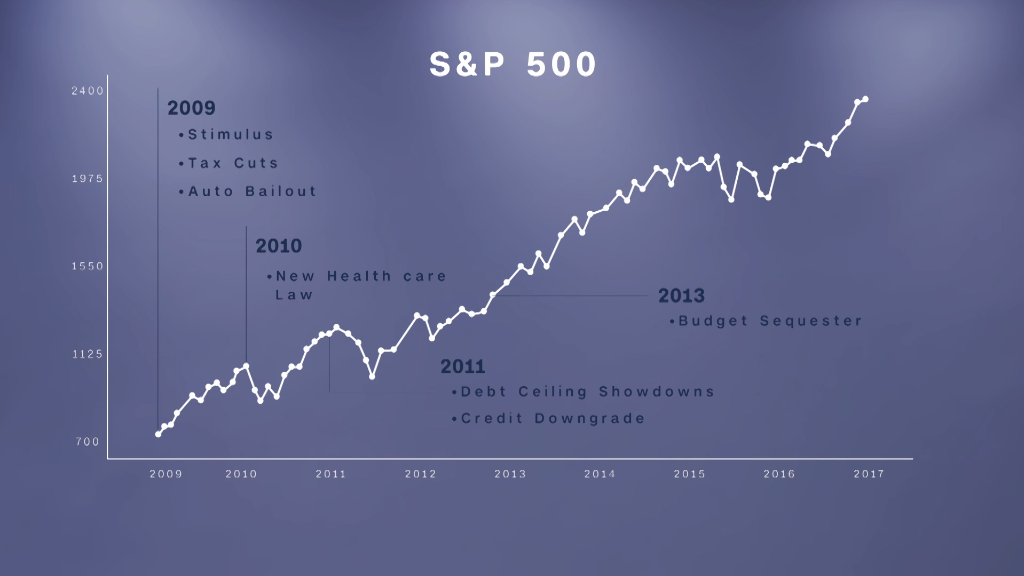
Wall Street's faith in the fate of the Trump agenda has been shaken, if not shattered, by political reality.
This week's market tumble is evidence of how the "Trump trade" that sent stocks and other risky assets booming after the election is showing serious cracks amid President Trump's struggles to push through a replacement for Obamacare.
Not only is the Dow on track for its worst month since January 2016, but other warning lights are flashing, too.
Favorite sectors like banks, manufacturers and small cap stocks are suddenly seeing red. Oil prices have collapsed to $47 a barrel, the U.S. dollar slumped to a four-month low against the Japanese yen and the VIX volatility index has shown signs of life.
Gold, which often rises during times of fear, has soared 8% so far this year and CNNMoney's Fear and Greed Index has swung back into "fear" territory. Cash fleeing to the safety of government bonds have lowered the 10-year Treasury yield down to 2.39%, a dramatic reversal from 2.62% just two weeks ago.
"The bumbling on the health care bill has people losing faith in the Trump Bump," Michael Block, chief market strategist at Rhino Trading, wrote in a note to clients on Wednesday.
Related: Caution: 1 in 3 investors fear stocks are overvalued
Tax cut jitters
On Tuesday, the Dow plunged 238 points, its biggest decline since September, as it became clear that Trump's Obamacare replacement bill is in doubt due to opposition from conservative Republicans.
Wall Street worries that the health care trouble could delay, or even derail, the other "pro-business" promises that have underpinned the Trump rally. That includes "massive" tax cuts that would juice corporate profits, as well as a push for dramatic deregulation and a burst of infrastructure spending.
"Health care is monopolizing the Congressional bandwidth and the market is desperate for a signal of tax reform progress," Isaac Boltansky, senior policy analyst at Compass Point, wrote in a research report.
Of course, it's important to put the recent market slide in context with the enormous rally of the past four months.
As White House press secretary Sean Spicer noted during Tuesday's briefing, the markets are still "up tremendously" since the election. Even counting this week's slump, the Dow is up an incredible 2,300 points over that span.
Related: Market may stall if Trump can't live up to the hype
Stocks priced for perfection
A pause, or retreat, is probably a good thing for the long-term health of the market rally. That's because the ferocious rally has made stocks so expensive that many say they're priced for perfection.
Thirty-four percent of fund managers polled by Bank of America Merrill Lynch say stocks are "overvalued," the highest level in the 17-year history of the survey.
"Markets have given themselves no room for error if the policy initiatives get delayed by a pronounced amount of time," Peter Boockvar, chief market analyst at The Lindsey Group, wrote in a report to clients.
The selloff reflects "a true naivete that somehow things get done smoothly in Washington," Boockvar wrote. "Do they ever?"
Nicholas Colas, chief market strategist at brokerage firm ConvergEx, agrees that the market retreat is all about the shifting landscape for Trump's agenda.
"Today marked the official end of 'Trump Trade 1.0' and it will take some time to ship Version 2.0. Washington, after all, does not work in New York minutes," Colas wrote to clients.
Health care failure could spook stocks
So where do stocks go from here?
It's possible they resume their upward trajectory if House Speaker Paul Ryan overcomes the rebellion from conservatives to pass the health care legislation.
Anthony Scaramucci, an informal adviser to Trump, told CNN on Wednesday that Trump is "going to get the health care thing passed."
Scaramucci, a former hedge fund executive, said Republicans "need to send a message to markets" even if they don't "like everything about the health care bill."
Even if efforts to replace Obamacare fail, markets could respond positively if Trump quickly pivots to tax reform.
On the other hand, Wall Street could throw a temper tantrum if the health care debate stretches deep into the spring or beyond.
That would likely further delay Trump's plan to rewrite the tax code, a very complex task that is looking increasingly less likely to get done by Trump's August goal.
"The worst outcome for the market would be for the health care repeal effort to continue dominating the legislative conversation in D.C.," Compass Point's Boltansky wrote.


